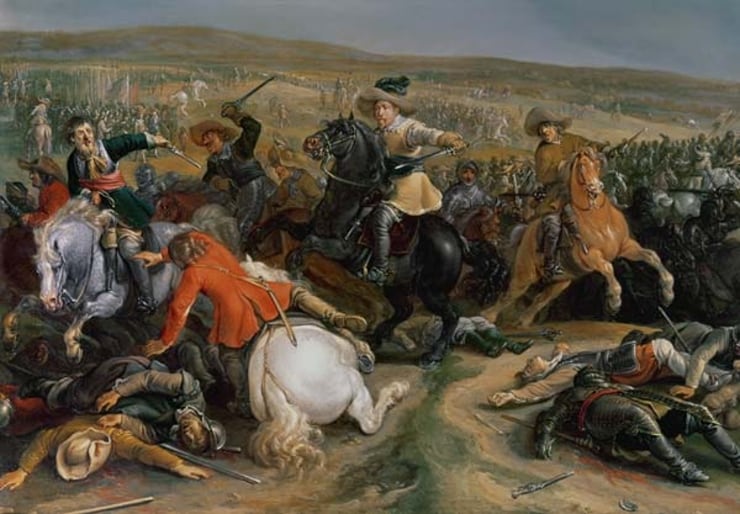16.11.1632 The Battle of Lützen was launched
Categories: Years of war and revolution , Calendar

16 Nov 1632 LaunchedBattle of LützenBattle of Lützen was one of the bloodiest in the history of the Thirty Years' War. However, it did not bring a clear victory to either side, although the Swedish king fell during the clash.
After his success at the Battle of Breintenfeld, Gustavus Adolphus resorted to an all-or-nothing strategy and ambushed the imperial leader Wallenstein at Nuremberg, where he deployed 500 cannons. Wallenstein saw through his ruse and both sides then turned to a strategy of attrition during the summer of 1632. In November, Wallenstein, thinking the war season was over, divided his forces into two hosts and withdrew to Leipzig for the winter.
Gustav caught up with him on the road leading from Lützen to Leipzig. To the right of Wallenstein's army lay Lützen Castle, while the Bavarian cavalry took up position on the weaker left flank of the Reich forces. The Swedes, initially held back by fog, managed to encircle this weak point in the Reich lines.
"The disaster of Wallenstein's new forces seemed inevitable until Pappenheim arrived with a second host of Reich troops. Meanwhile, the Swedish left, under Bernard of Weimar, was in serious trouble," writes R. G. Grant in Battles: 5000 Years of Warfare.
Gustavus Adolphus led a cavalry charge to free his beleaguered troops, but was killed during the blows. Bernard of Weimar was subsequently able to outflank the right flank of the Reich's army, thus securing overall victory. At dusk, Wallenstein retreated to Leipzig and then to Bohemia. Although the Swedes remained in possession of the battlefield, the most serious consequence of the battle was the loss of the leading fighter for the Protestant cause, the "Lion of the North" Gustav Adolf.
This temporarily crippled the Swedes. "Wallenstein may not have won, but the Battle of Lützen was seen by the emperor in Vienna as a strategic victory that may have saved his throne. The imperial commander was now also rightly regarded by the Swedes as the man who would form the proverbial balance in the further development of the war. They therefore sent emissaries to him from among the Bohemian emigrants, to try to find out whether he would not be willing, after all, to come over with his army to the side of the anti-Habsburg coalition, as he had suggested a year earlier," writes Vladimír Liška in his book The Mysterious Fates of Famous Figures in Czech History.
Albrecht von Wallenstein was no naive fool to believe such promises. The emigrants had nothing but what they managed to take abroad from Bohemia, and their possessions were then confiscated, given away and sold off by the Emperor. The confiscated estates of the Czech Protestant emigration now belonged to other owners.
Sources.
The article is included in categories: